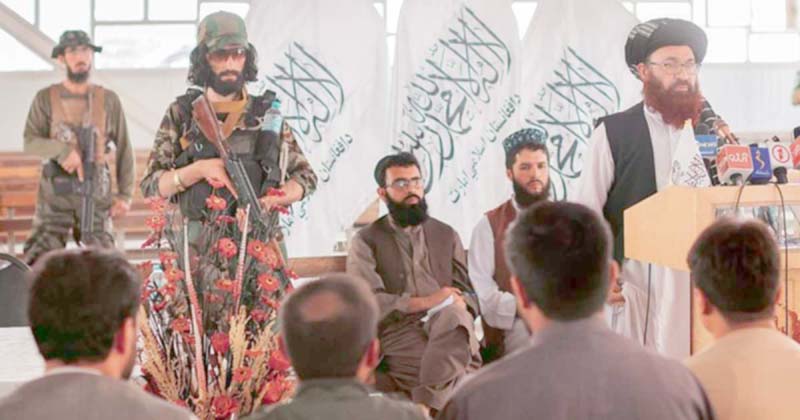By Rustam Shah Mohmand
Islamabad and regional countries must realize that any chaos that may occur leading to a breakdown of the law and order situation would be the direct outcome of the withholding of billions of dollars worth of Afghan assets in American banks. Nearly six months after the Taliban took control of the country, the non-recognition of their regime by the world continues to haunt the government in Kabul.This was something the new government was not prepared to anticipate. Taliban rulers were hopeful that the end of the long conflict and their complete control of the country would be greeted and acknowledged. They were also looking forward to working with the international community to begin the enormous task of rebuilding their war-ravaged country. The Taliban leadership emphatically declared there would be no ban on girls’ education as well as women’s rights to seek jobs.There was also a commitment to protect the rights of all minorities. Some of these pledges are being addressed while some will take a few more weeks like arranging separate classes for girls’ education in colleges. But the world appears to be oblivious to the tremendous change that has happened with very little fighting or bloodshed. Leading the camp of the naysayers is the United States.The US has some genuine strategic reasons. It fears China will emerge as the sole super power on the political landscape of the region once Afghanistan gains stability and the Belt and Road Initiative is successfully completed. Countries like Pakistan are reluctant to act alone and recognize the new government if that will strain relations with Washington. The recognition saga has now entered a crucial phase. The US has withheld Afghan assets worth more than $7 billion with a devastating effect on the economy that is about to collapse. Millions are jobless; health care systems are crumbling; millions face starvation; the police force has nearly disintegrated; chaos looms. Surprisingly, there is little or no understanding of the dire consequences that will follow if the immediate problems of poverty, hunger and disease are not addressed. For sure, food insecurity will lead to widespread discontentment and displacement of the population. Any collapse of order will send powerful signals to the many warlords who fled the country after the Taliban takeover, fearing accountability for the crimes they committed in their areas of control and influence. The Uzbek warlord Abdurrashid Dostam is waiting for an opportunity to return and ignite the flames of racial discrimination and inequality. Dostam has backing of large numbers of ethnic Uzbeks in northern Afghanistan. Ustad Ata the formidable Tajik leader of Balkh, now in exile, would lose no time in seeking revenge and restore his position as the undisputed leader of Tajiks of Balkh and the surrounding provinces. Having ruled the state for many years, Ustad Ata continues to command a large following in the Tajik majority areas of Northern Afghanistan. Commander Ismail Khan, the powerful warlord of Herat in western Afghanistan has remained the undisputed leader of Herat. His return could be a decisive factor in the new emerging situation if the threat to the Taliban government persists or deepens. Son of the late Ahmad Shah Masoud would be weighing his chances too if there is a chance for a comeback. There are others waiting for any news of a breakdown that could be conducive to their return. If the situation deteriorates, these warlords will see a chance for themselves. The people of their areas of influence would welcome such a return of warlords not because they are so devoted to the cause they espouse, but because they would be seen as saviours in a situation which could not be more ominous. This is a moment to take pause and think. The return of warlords will change the whole complexion of the situation. Fiefdoms would reemerge all over. Battles for supremacy, control would be the new normal. Circumstances will be ideal for the breakup of the country along ethnic lines. Would that be an ideal situation for the country and its neighbors? To prevent the return of warlords who would be desperate to regain control of their areas through armed conflict, the current government will have to be acknowledged and need to engage on all issues of lasting peace and security. That is the only workable, pragmatic option open to the world. The gravity of the alternative would be too horrendous to contemplate. As an immediate neighbor with a long border with Afghanistan, Islamabad will need to comprehend and anticipate the grave repercussions of a senseless policy that keeps the new Kabul government in a state of limbo. Seeking regional consensus on formally recognizing the new dispensation may be a desirable objective but time is running out and the plight of the masses is worsening by the day. Recognition is inevitable. Credentials justifying recognition exist. Why then delay taking an action that cannot be deferred for too long? In the meantime, suspicions in Afghanistan about the ability of Pakistan taking action in its own national interests deepen. Islamabad and regional countries must realize that any chaos that may occur leading to a breakdown of the law and order situation would be the direct outcome of the withholding of billions of dollars worth of Afghan assets in American banks. All efforts, covert and overt must be aimed at releasing the funds to prevent the disintegration of the governance systems. The cost of indifference is too high to estimate. Rustam Shah Mohmand is a specialist in Afghanistan and Central Asian Affairs. He has served as Pakistan’s ambassador to Afghanistan and also held the position of Chief Commissioner Refugees for a decade. The article originally appeared at Arab News Pakistan and has been republished with the author’s permission. The views expressed in this article are the author’s own and do not necessarily reflect the editorial policy of Global Village Space.


